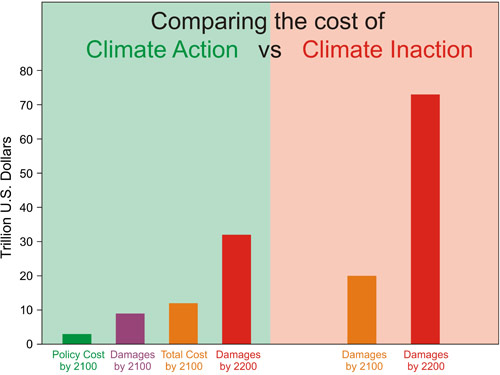
Writer and Web page info
- This web page: https://www.globalissues.org/article/806/action-cheaper-than-inaction.
- To print all info (e.g. expanded facet notes, exhibits different hyperlinks), use the print model:
On this web page:
Value of inaction on local weather change far greater than the price of motion
A variety of nations and corporations have lengthy been frightened that the prices of tackling local weather change (prevention, mitigation, adaptation, and many others) can be prohibitive and would moderately take care of the results. They usually assume (or hope) the results is not going to be as dangerous as scientists are predicting.
For example, in December 2011, Canada pulled out of the Kyoto local weather treaty — which it’s legally allowed to do — to condemnation domestically and internationally. One of many most important considerations had been the fee to the tax payer: (CAN) $14bn.
<script type=”text/javascript”> atOptions = { ‘key’ : ‘015c8be4e71a4865c4e9bcc7727c80de’, ‘format’ : ‘iframe’, ‘height’ : 60, ‘width’ : 468, ‘params’ : {} }; document.write(‘<scr’ + ‘ipt type=”text/javascript” src=”//animosityknockedgorgeous.com/015c8be4e71a4865c4e9bcc7727c80de/invoke.js”></scr’ + ‘ipt>’); </script><\/p>
But, the financial prices of inaction are within the trillions:

(Some consider one in all Canada’s motivations to go away Kyoto was on its want to guard the profitable however extremely polluting exploitation of tar sands, the second largest oil reserve on this planet
, as The Guardian had famous.)
Issues about prices usually ignore the opposite advantages of motion
Local weather change issues additionally have an effect on folks’s well being instantly, in addition to impacting the surroundings. For instance, fossil fuels utilized by automobiles in closely congested areas result in extra pollution dangerous to human well being. Tackling local weather change by limiting fossil gas use and investing closely in options has the extra advantage of enhancing well being, and even probably decreasing visitors congestion. That is the view of some main reviews not too long ago launched.
Economist Paul Krugman summarizes a pair:
A massive research by a blue-ribbon worldwide group, the New Local weather Financial system Mission, and a working paper from the Worldwide Financial Fund. Each declare that sturdy measures to restrict carbon emissions would have hardly any destructive impact on financial development, and would possibly really result in quicker development.
In impact, these research are saying that not solely might local weather change prices be minimized by means of motion, nevertheless it might flip into financial advantages.
One other concern by some nations is they will’t do issues — even when they wished to — as a result of if different nations are usually not subjected to carbon emission discount targets then they’ll lose out competitively. Nevertheless, the IMF notes that the extra financial advantages of decreasing carbon emissions make it value pursuing with or with out others doing it.
Up to now, value alerts have usually missed out well being and different penalties of sure financial actions. GNP and comparable measures thus don’t reveal the true prices in financial exercise. In some instances it’s even made to look the reverse. For instance, a thriving trade promoting unhealthy meals, plus the earnings made by non-public well being corporations addressing the results, all assist contribute to the GNP of a nation. The prices borne by society (the drain on public well being sources, or numerous social and particular person penalties, for instance) are sometimes not factored in.
More and more although, there are makes an attempt to try to account for these items. Within the biodiversity part of this website, there’s a half discussing makes an attempt to give biodiversity an financial worth to ensure that companies and governments to have a extra tangible understanding of what worth pure sources present to our economic system and nicely being, thus giving extra instruments and motivation to assist protect the surroundings and develop extra sustainably.
And the above article by the IMF exhibits that with carbon pricing, the knock-on results are extra constructive than inaction if you happen to get the vitality value proper.
Many fossil gas industries have been propped up by governments. Whether or not they would have the ability to compete in opposition to a rising renewables trade by itself is difficult to know, however alternatively if the renewable sector got the kinds of subsidies that fossil gas industries obtain then the prices of renewables can be even decrease than they’re already turning into.
As well as, the environmental and different prices from fossil gas use are usually not factored into the costs we pay for this type of vitality, making them artificially decrease than they need to be (even when we do really feel vitality prices could also be excessive in the meanwhile).
Paul Krugman summarizes these factors by merely noting:
It’s simpler to slash emissions than appeared attainable even a number of years in the past, and decreased emissions would produce giant advantages within the short-to-medium run. So saving the planet can be low cost and possibly even come free.
…
The concept that financial development and local weather motion are incompatible could sound hardheaded and lifelike, nevertheless it’s really a fuzzy-minded false impression. If we ever get previous the particular pursuits and beliefs which have blocked motion to save lots of the planet, we’ll discover that it’s cheaper and simpler than virtually anybody imagines.
As defined in additional element on this website’s part on vitality safety, tackling local weather change by means of addressing our use of fossil fuels could have some geopolitical advantages, too. For instance, much less reliance on fossil fuels might assist scale back navy and geopolitical involvement in different components of the world, which itself is pricey. With much less want for fossil fuels from risky areas of the world, the help given to pleasant autocratic and dictatorial regimes might dwindle. Possibly that might make it simpler to help regimes which are extra democratic and those that respect folks’s rights extra? Such advantages appear even tougher to place an financial worth to, however would appear nicely well worth the effort?
Writer and Web page Data
- Created: